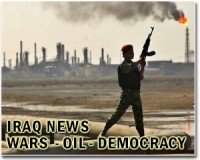 |
United Nations (AFP) Dec 15, 2010 The UN Security Council on Wednesday ended key international sanctions imposed on Iraq in a major move toward bringing closure on the Saddam Hussein era. Three council resolutions halted punishing international restrictions to prevent weapons of mass destruction proliferation and ended the UN oil-for-food program for Iraq. The action will allow Iraq to start civilian nuclear activities, but was intended mainly to highlight the establishment of a democratic, internationally-recognized government, diplomats said. US Vice President Joe Biden and UN Secretary General Ban Ki-moon led praise for Iraq's democracy efforts while warning that it must make a final peace with neighboring Kuwait and that major security challenges remain. The 15-nation council passed one resolution lifting sanctions imposed in 1991 to stop Iraq building nuclear, chemical and biological weapons. Saddam's alleged arsenal of weapons of mass destruction was among the main justifications for the US-led invasion in 2003, but no such weapons were found following his ouster. A second resolution formally ended the oil-for-food program which allowed the late Iraqi dictator to use billions of dollars of oil money to buy food and medicine between 1996 and 2003. A third resolution extended UN protection by six months for hundreds of millions of dollars in the Development Fund for Iraq which was set up after the 2003 war to handle oil and other revenues. France abstained from the oil-for-food vote, saying additional financial guarantees were required. The others were passed unanimously. Iraq has been the target of about 70 UN resolutions since its 1990 invasion of Kuwait. The latest meeting was intended by the United States, which chairs the Security Council for December, as a symbolic recognition of the changes since Saddam's downfall and execution. Biden said the Iraqi people have "flatly rejected the grim future offered by extremists" and that the number of violent attacks was now at a low since the US-led invasion in 2003. "Iraq is on the cusp of something remarkable -- a stable, self-reliant nation," Biden said. A Security Council statement recognized "that the situation now existing in Iraq is significantly different from that which existed at the time of the adoption of resolution 661" after Iraq's invasion of Kuwait. "The adoptions of these important resolutions marks the beginning of the end of the sanctions regime and restrictions on Iraq's sovereignty, independence and recovery," Iraqi Foreign Minister Hoshyar Zebari said. "Our people will rejoice for having turned a chapter on the aggressive, belligerent and defiant behavior of the previous regime toward international law and legitimacy" he told the council. But the UN leader Ban stressed that Iraq must work to agree on a border with Kuwait and settle a dispute over war reparations if all sanctions are to be ended. Iraq still pays five percent of revenues from its oil sales into a reparations fund for Kuwait, which is demanding that Iraq pay another 22 billion dollars. "Iraq still has some way to go to resolve all outstanding issues with brotherly, neighborly Kuwait," Zebari said, but he vowed it would "top the agenda" of the new government. While recognizing the changes, Ban said "Iraq remains a challenging environment" which will need political and financial support, particularly after the departure of remaining US troops in 2011. The Iraqi people "continue to struggle with insecurity and appalling violence. They lack jobs and basic services. But today we recognize how far the country has come in key aspects of its journey to normalize its status in the community of nations." The UN Security Council agreed in February to lift civil nuclear curbs on Iraq after it ratified a number of international agreements, including the International Atomic Energy Agency's Additional Protocol, which allows for extra international nuclear checks. Iraq has been applying the accord, which has yet to be ratified by its parliament.
Share This Article With Planet Earth
Related Links Iraq: The first technology war of the 21st century
 Iraqi forces face key security test over Ashura
Iraqi forces face key security test over AshuraKarbala, Iraq (AFP) Dec 14, 2010 Iraqi forces will provide security for Ashura ceremonies this week in Karbala with no active support from US forces, in a key test of their capabilities ahead of an American pullout in a year. Heavy security is being deployed in the Shiite Muslim shrine city for Ashura, which marks the slaying of the revered Imam Hussein by the armies of the caliph Yazid in 680. It has in previous years ... read more |
|
| The content herein, unless otherwise known to be public domain, are Copyright 1995-2010 - SpaceDaily. AFP and UPI Wire Stories are copyright Agence France-Presse and United Press International. ESA Portal Reports are copyright European Space Agency. All NASA sourced material is public domain. Additional copyrights may apply in whole or part to other bona fide parties. Advertising does not imply endorsement,agreement or approval of any opinions, statements or information provided by SpaceDaily on any Web page published or hosted by SpaceDaily. Privacy Statement |